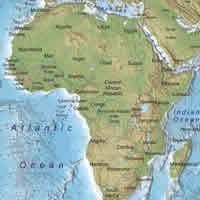Economic growth: Is Africa turning the corner?

Stephen Ellis Correspondent
Two years ago, enthusiasm for commercial opportunities in Africa was immense. Sections of the financial press then, and still now, enthused uncritically about a continent experiencing high rates of economic growth. This is sometimes called the “Africa Rising” scenario, referring to the idea that Africa represents an emerging economic area the same way that south-east Asia did perhaps 25 years ago.
Africa as a whole continues to show impressively high rates of economic growth and some other signs of what are often seen as economic virtue.
Nevertheless, I think that the last two years have shown why we cannot assume that the continent has now “taken off,” or “turned the corner,” or any of the other clichés so often applied to Africa.
The idea of development in its modern sense became fashionable after 1945.
In the 1950s and 1960s, which was of course the golden age of Africa’s independence, development was the subject of earnest works in economics, sociology and political science.
Academics, planners and technocrats generally assumed that true development takes place in phases that can be identified by social scientists, as low-level agricultural economies evolve and people move to towns to provide the labour force for industrial production.
This is what happened in countries that developed early, in Europe and the USA, and it is broadly what happened also in parts of Asia that are now prosperous.
However, it is now clear that Africa’s high levels of economic growth, even if they are sustained for a lengthy period, are not leading to the sort of economic and political development that has been regarded for the last 60 years or so as a standard model.
There is little evidence in Africa’s recent growth of the sort of structural change that development theorists might regard as desirable, notably a degree of industrialisation.
The region’s impressive growth in the years from 1995 to 2005 and its recovery from the global financial crisis of 2008-09 were driven primarily by new mineral discoveries, rising commodity prices and the strength of domestic demand.
A sober view is that, in the absence of the right sort of structural change, it is doubtful whether sufficient growth can be sustained for Africa as a whole to reach middle-income levels by 2025.
Moreover, there are reasons to question whether high growth rates will translate into much that can plausibly be called development in terms of nationwide health care and other social indices.
This is likely to happen only if economic growth is accompanied by suitable policies implemented fully by states that have the means to realise their ambition. And even states like these need luck.
Some of the literature that has emerged on the Africa Rising scenario is very dubious.
In the worst cases, articles and books look like nothing more than hype by financial firms wishing to encourage investment in one of the few parts of the world offering high returns — for now.
I have to include in this category some texts by the influential economist Jim O’Neill, the former chairman of Goldman Sachs Asset Management and former head of global economics research at Goldman Sachs, who is most famous for coining the acronym BRICS to describe Brazil, Russia, India and China, now joined by South Africa as the core of a new economic bloc that is shifting power away from the older economies of the G7.
In the last two years Dr O’Neill has coined another acronym, MINT, standing for Mexico, Indonesia, Nigeria and Turkey. He considers that Nigeria, on the basis of its young, expanding population and booming consumption, could become a new China.
Things may change, of course — but not necessarily in a benign sense. This same Nigeria, that is sometimes described as a potential China, is also home to the Islamist movement Boko Haram, that now rules substantial territory in the north-east of the country and has declared itself a caliphate.
Anyone contemplating the future has to consider the fact that booming Lagos is situated in the same country as violence-torn Borno State.
Nigeria and Kenya are among Africa’s best economic performers. But in thinking about the future of the continent, we have to also bear in mind places like the Central African Republic and South Sudan where the prospects of a strong and efficient state developing are close to zero. — African Executive









Comments